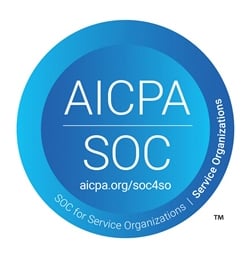Data Exchange for Non-Government Organizations & Institutions
Make better-informed decisions and deliver efficient support to the people and the planet by improving data collaboration with internal and external stakeholders.
Exchange data and collaborate with organizations and governments around the world
The COVID-19 crisis illustrates how critical and strategic data exchange is in resolving global crises and addressing major concerns. NGOs and institutions now realize that better data circulation is essential to building a better world.
Whether they are related to climate, food, diseases, humanitarian concerns, economy, environment or society, all major challenges of the twenty-first century can be successfully met through better access and use of data gleaned from multiple sources and organized within data ecosystems. Data ecosystems have become a fundamental component of business competitiveness and economic sovereignty by fostering innovation.
Organizations who share data have improved outcomes due to more informed decisions, sharper insights, and improved collaboration, and they can offer more relevant services for the people and the planet.
The 2022 Davos agenda addresses the importance of Data Ecosystems
More than $20 billion in new value has been created by public-private data exchanges for the common good. They have adopted innovative business models, privacy-enhancing new approaches and technologies to strengthen citizen trust.
The challenges organizations are facing today, whether economic, environmental or societal, have become so complex that it is impossible for any individual organization or government to solve them by themselves. Sharing and exchanging data between multiple stakeholders at scale has become an imperative.
The 2022 Davos Agenda had 4 dedicated sessions on data exchange and data sharing.
Listen to the panel entitled “Strengthening Trust in Public-Private Data Exchanges” where Fabrice Tocco, Dawex co-CEO, is sharing his vision on new data exchange ecosystems.
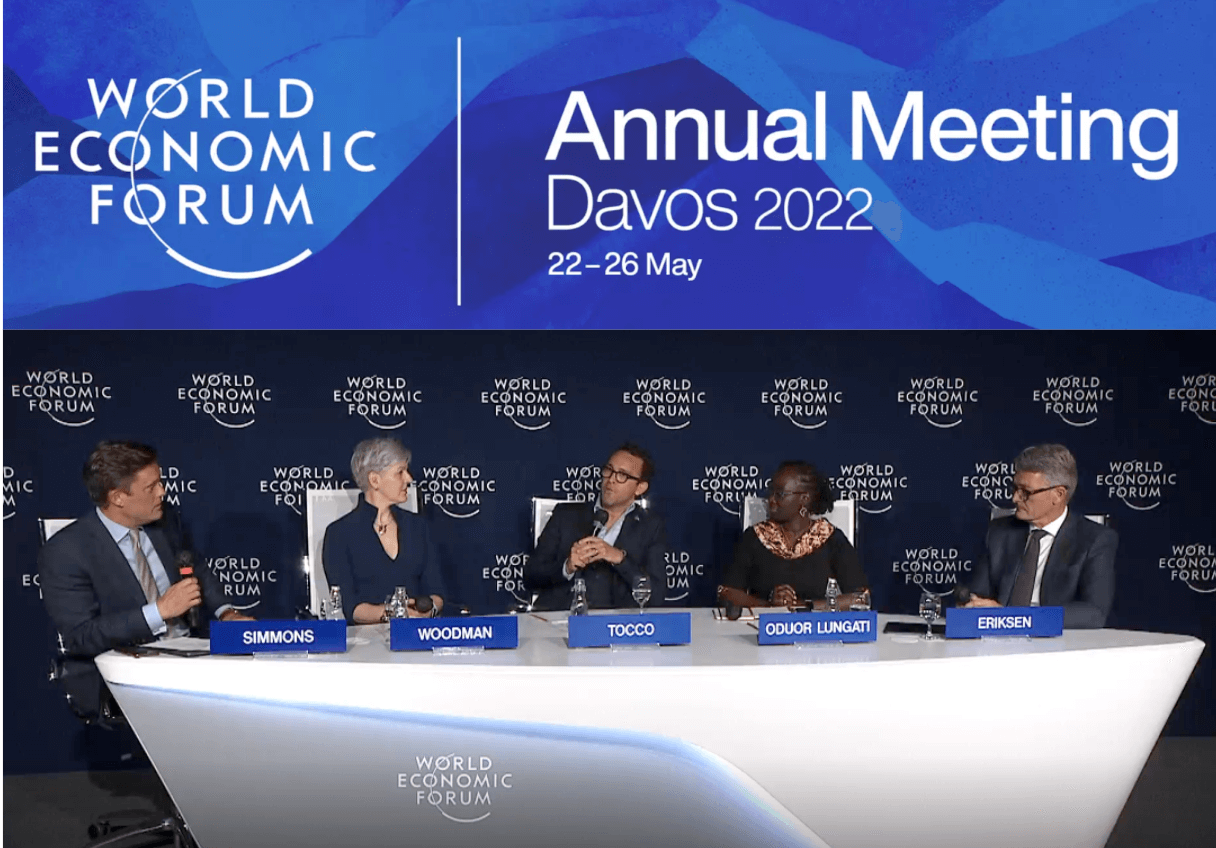
“Public-private data exchanges for the common good have created more than $20 billion in new value as they have adopted innovative business models, privacy-enhancing technologies and new approaches for strengthening citizen trust.”
Source: World Economic Forum, Davos, 2022
Improve collaboration with internal and external stakeholders
Industry Data Spaces or Data Exchange Solutions, operated by non-government organizations, would offer policy makers, NGOs and institutions, as well as organizations from the private sector, a secure and trusted environment to fulfill their core mission through better sourcing, sharing and exchange of data.
Humanitarian and health emergencies
Accelerating response with Data Exchange
The COVID-19 pandemic has illustrated how critical data use is to build up fast response in crisis situations. Data Exchange Solutions offer a trusted environment to facilitate and accelerate data circulation while ensuring traceability and security over the data transaction. Here are some use cases where data sharing is a game changer:
- Speed-up the search for new drugs & solutions and anticipate where scarce supplies will be most needed
- Understand the spread of diseases and predict effectiveness of different actions to slow it
- Bring together scattered non-standardized data to create a common picture of needs and response

“We urgently need a renewed focus on achieving global digital and data governance, developing global digital public goods, increasing trust and reducing uncertainty in the digital economy. The pandemic has shown the critical importance of sharing health data globally.”
Rebeca Grynspan
UNCTAD Secretary-General
Source: Digital Economy Report 2021
Climate change
Reducing carbon footprint
Climate change requires immediate and far-reaching action. According to the BCG, cross-sector data partnerships contribute to speeding up the journey to net-zero GHG emissions by 5 to 10%. Data Exchange solutions are key in helping climate related data circulate and raising awareness among the many stakeholders with the following goals:
- Deliver more accurate and timely weather- and climate-related analysis
- Work out a complete and accurate supply chain-wide carbon footprint by sharing carbon-equivalent data
- Create digital twins to provide highly accurate predictions of climate future developments
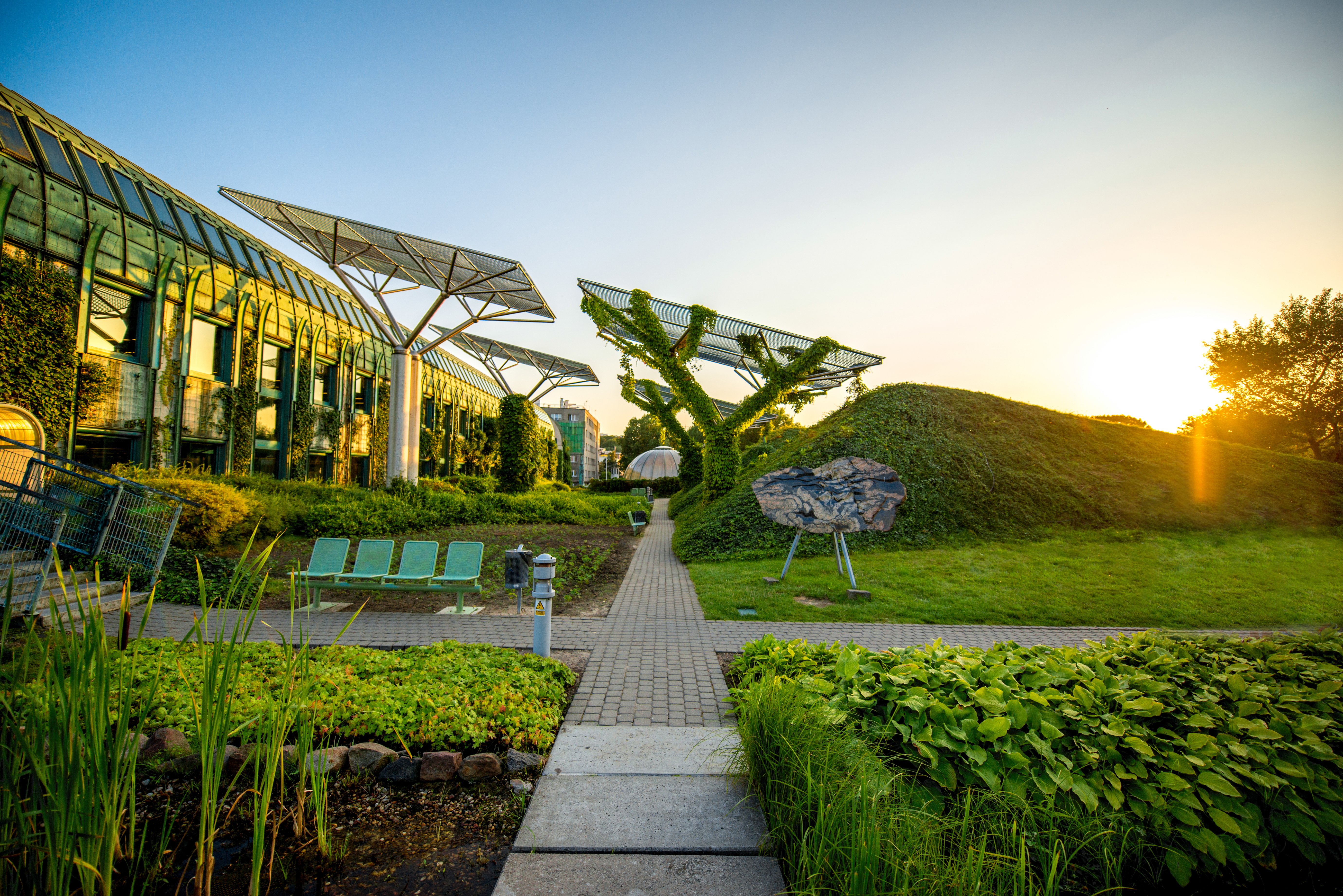
“Successful weather and climate services are completely dependent upon continued access to observational data from around the globe, exchanged internationally.”
Professor Petteri Taalas
World Meteorological Organization Secretary-General
Source: WMO Unified Data Policy Resolution, Sept. 2021
Sustainable development
Improving natural resource management
Natural resources and biodiversity are threatened by human activities. Sharing and exchanging data can optimize the use of natural resources and reduce the human footprint:
- Monitoring of forest cover with earth observation data collected by satellites, drones and other connected devices
- Creating climate-based use cases to help farmers make the right operational decisions and reduce chemical inputs
- Using sensor data from fishing vessels to create a best practice fishery management system

Trade and macroeconomy
Monitoring trends and forecast economic developments
The need for statistical, economic and social data has never been so critical to understand the transformations the world is undergoing. Data Exchange solutions improve data accessibility and can be used to preserve economic sovereignty. Facilitating data circulation through trusted and secure data exchange environments enables the development of powerful use cases, among them:
- Governments can better compare the effectiveness of their public policies
- Economic trends can be better monitored, analyzed, and forecasted
- The interconnection with other data ecosystems allows building innovative policies through collaboration
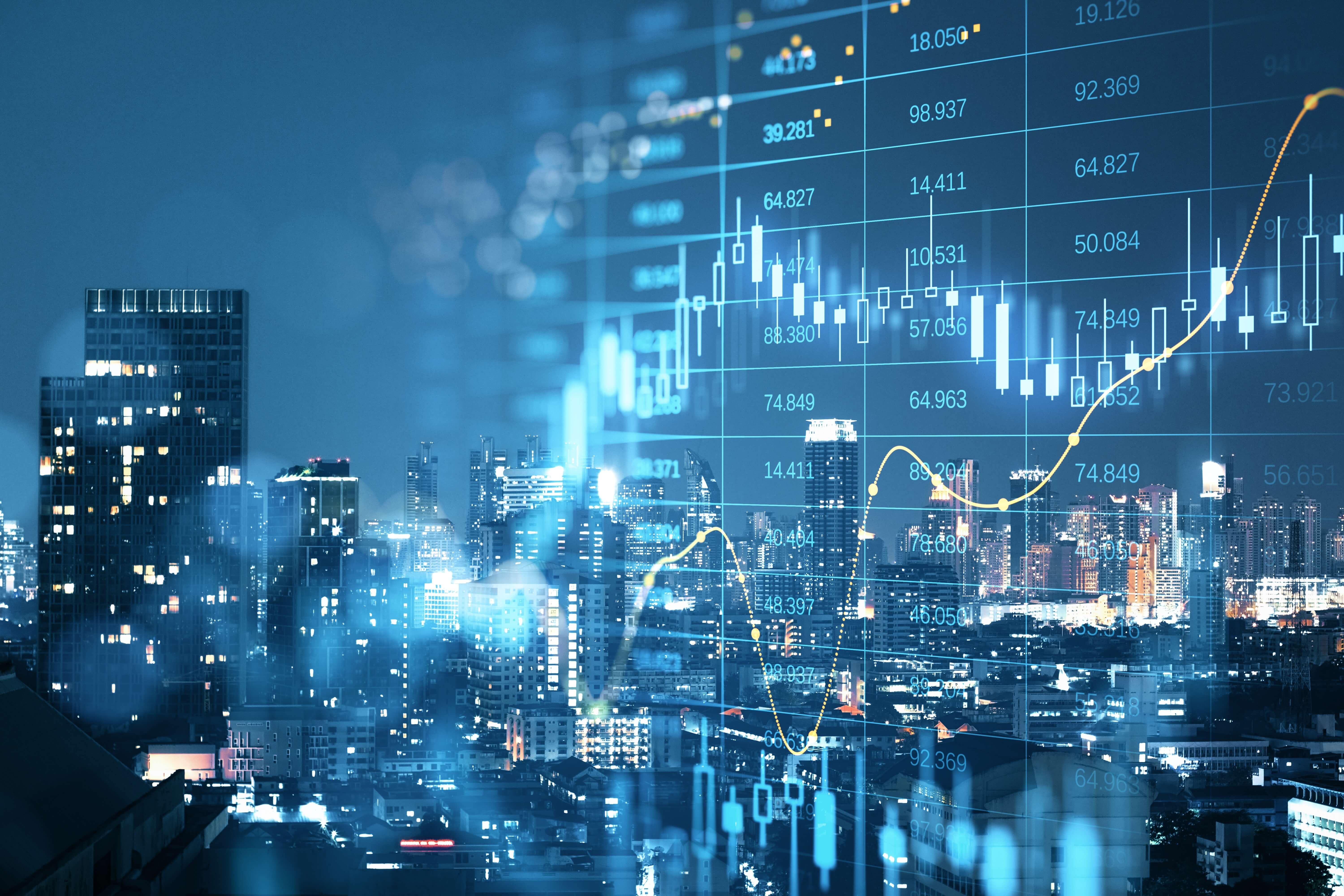
Organizations’ cooperation
Optimize internal and external stakeholder cooperation to meet strategic objectives
Data exchange within and between organizations facilitates the circulation of data and information sharing, allowing teams to improve communication, gain operational efficiency, foster new products and services, and create partnerships to capitalize on the richness and full potential provided by data. By accelerating the flow of data flow, NGOs and institutions can:
- Take an important position in their ecosystem and become real data hubs for other organizations, institutions and government
- Leverage data to optimize supply chains and make them more resilient
- Create rich reportings on cross actions implying several stakeholders to achieve common goals
“At the core of our Strategy is a simple idea: We start with data action that adds immediate value for our organization and the people we serve.”
António Guterres
United Nations Secretary-General
Source: “Data Strategy of the Secretary-General for Action by Everyone, Everywhere”, 2020-2022
Data Exchange, an integral part of the World Economic Forum Transformation Map
The World Economic Forum Global Future Council on Data Policy undertook the impressive work of mapping the forces that are transforming the data ecosystem. As a Tech Pioneer and member of the Global Future Council, Dawex was invited to deliver the Data Exchange perspective.
The need for exchanging data between public and private organizations has never been more crucial as it addresses business and societal challenges, reinforcing public-private partnerships to foster new cooperation power based on data circulation.
The benefits created by the circulation of data are infinite.
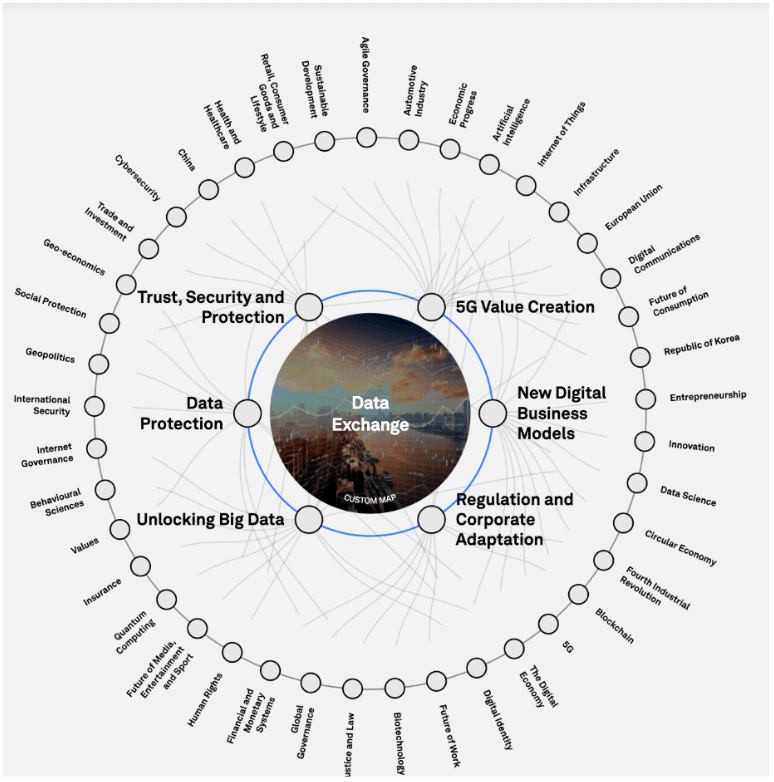
Cross-border data flows pinpointed by the OCDE
At the G7 Summit 2022 in Germany, the OECD organization published a report entitled "Cross-border data flows : Taking stock of key policies and initiatives”. The report highlights the importance of facilitating data exchange domestically and internationally in order to accelerate cross-border data flows.
With the objective to advance a common understanding on the progresses in policy and regulatory approaches that leverage the full potential of data for global economic and social prosperity, the report pinpoints JDEX and Dawex Data Exchange technology to illustrate a successful data exchange initiative.
Gain insights into the role of data ecosystems in survival
In the 2022 MIT CDOIQ Symposium, the central role of data exchange in future economies was explored by experts representing world institutions, industry, infrastructure, and mobility. Tomoaki Nakanishi of the World Economic Forum discussed the critical nature of data for making the best decisions in all domains – environmental, economic, and social. Mr. Nakanishi and other panelists highlighted the importance of creating trust in data exchange in building resilience, especially relevant for developing and nascent economies.
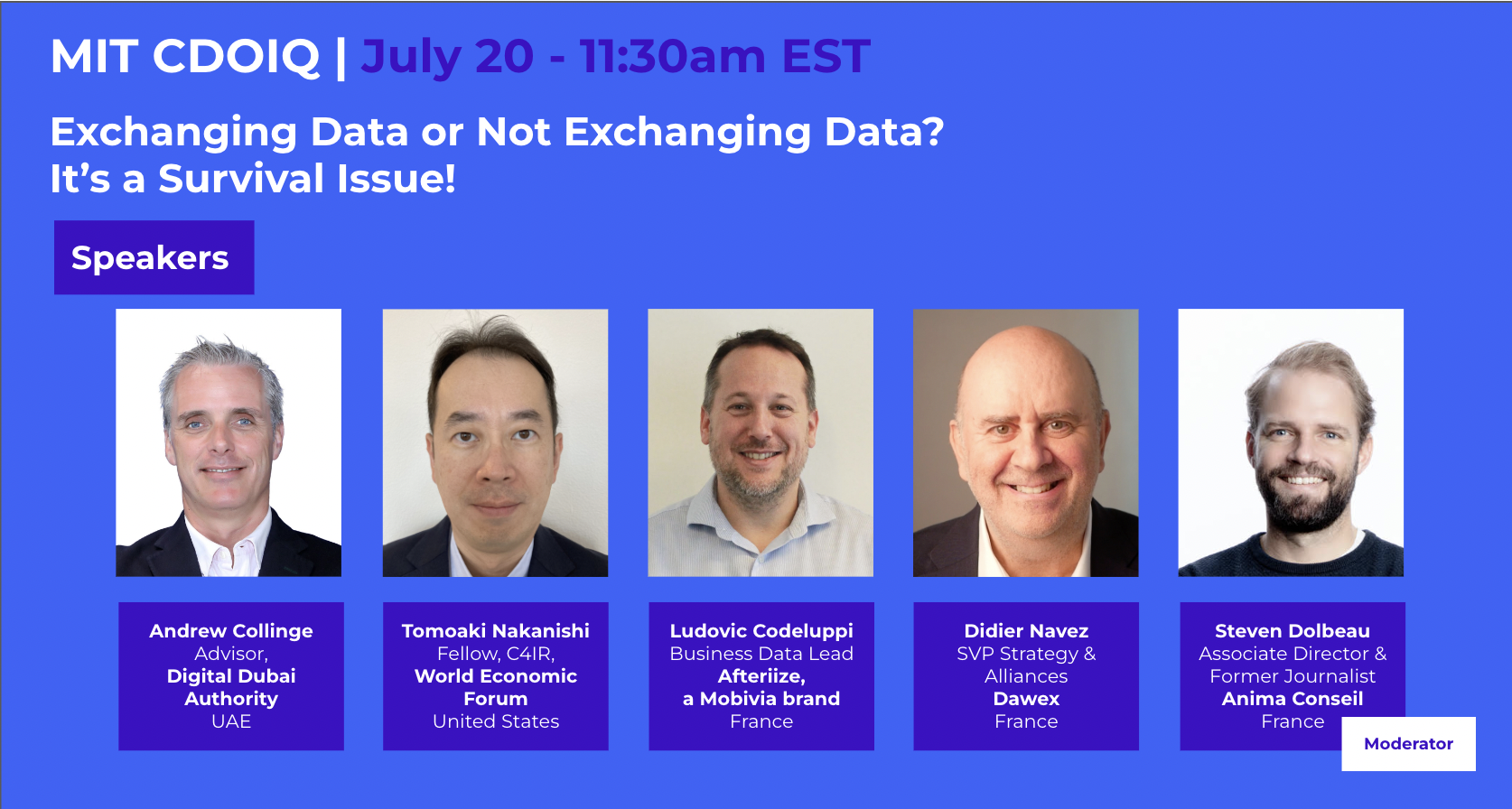
A guide for your Data Exchange journey
Non-government organizations’ needs for data to fulfill their core mission vary greatly, and the finer points of data exchange can be challenging to grasp. Dawex Data Exchange Advisory teams have the expertise to quickly onboard you on your Data Exchange journey, help you build a solid plan and strategy to unlock the potential of your data assets in order to improve data collaboration with internal and external stakeholders.


